In March 2018, about 17 months ago, President Donald Trump confidently – even arrogantly – said that trade wars are good, and easy to win. His first shot at Mexico, imposing a 25% tariff on steel and a 10% tariff on aluminium, helped spark a 420-point drop in the Dow Jones Industrial Average (DJIA) and started trade wars with a couple of countries, especially with China.
But what was supposedly a quick, good and easy trade war with China appears to have turned into a nightmare for the U.S. president. While Mexico, Canada and other allies like Japan, India and even the European Union have not dared openly challenge the United States, the Chinese refuse to suck up and kowtow to the Trump administration – telling the U.S. to bring it on.
Despite Trump’s insistence that China is footing the bill for the massive tariffs he has slapped on foreign goods coming into the United States, which is a huge lie, Americans increasingly doubt their president. The Commander-in-Chief told his supporters in Ohio last Thursday the same bull story – that the Chinese, not fellow Americans, are paying for the tariff.
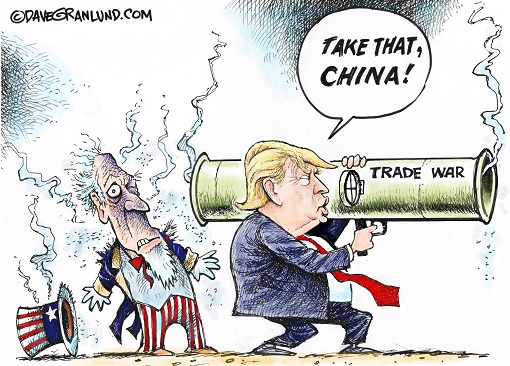
To juice up his story, Trump added a little twist, claiming that the China’s evil plan included currency devaluation. Hours after announcing the 10% tariff imposed on the remaining US$300 billion goods from China, he told the audience – “China devalues their currency, they pour money into their system. Because of that, you’re not paying for those tariffs. China’s paying for those tariffs.”
Again, economists rubbished Trump’s incorrect remarks. Tariffs are taxes on goods coming into the U.S., so they are being paid by the importer. The exporter – in this case, China – doesn’t pay a dime. Stephen Redding, a Princeton University economist, said – “All of the U.S. tariffs have been passed to U.S. importers, U.S. retailers, U.S. consumers. Somebody in the U.S. is paying higher prices.”
Tariffs or simply taxes are designed to make foreign-made goods more expensive, hence boosting domestic producers. The levy can also be used to force international exporters to slash prices to stay competitive. However, there’s no evidence China is cutting prices to accommodate Trump’s tariffs. The proof that Americans are footing the bill can be found in 2018 customs data.

According to a research done by the Federal Reserve Bank of New York, Americans – without them realising – are already paying an additional US$831 each year per household, after Trump raised tariffs to 25% from 10% on US$200 billion of U.S. imports from China back in May. Clearly, Americans will be paying more after the latest 10% tax hike on US$300 billion goods.
The new 10% tariff, to be effective next month (September), already has led Moody’s Analytics chief economist Mark Zandi to raise his recession odds over the next 12 months to 50% from 35%. If Trump goes bonkers and raise the 10% tariff to 25%, as he had warned, a recession would be likely next year – according to Gregory Daco, chief U.S. economist of Oxford Economics.
But if the impact on American consumers has been so disastrous, why hasn’t anybody stopped the crazy president? They have – but failed. According to the Wall Street Journal’s latest bombshell, Trump slapped the Chinese 10% tariff after China refused to commit to buy agricultural products from American farmers at Shanghai talks – despite objections of nearly his entire trade team.
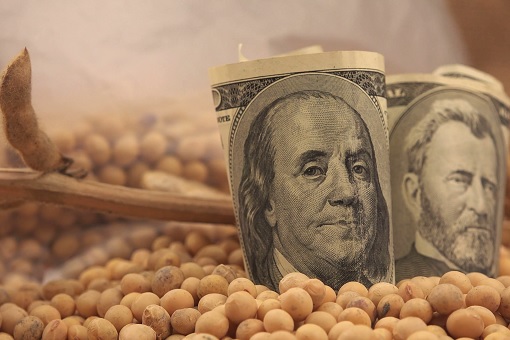
The impulsive and reckless president had overruled his advisers’ objection. China’s refusal to buy American agricultural goods in large quantities, despite a promise to do so was a humiliation to Donald Trump. It was like a slap in the face of the U.S. president, prompting him to launch his final tariffs on all remaining Chinese goods that had not been taxed.
Trump apparently was furious when Treasury Secretary Steven Mnuchin and U.S. Trade Representative Robert Lighthizer came home empty-handed after the Shanghai talks. The U.S. president wanted to give farmers, who have been hit hard by the trade war, guarantees that China was boosting its U.S. purchases as he prepared for a rally in Ohio.
And now it appears that China, despite its denial, might have quietly devalued its currency as retaliation against the 10% tariff imposed by the U.S. In the afternoon of Asian trading hours, the Chinese Yuan changed hands at above 7 critical levels against the dollar. The last time the currency breached that level was during the global financial crisis in 2008.
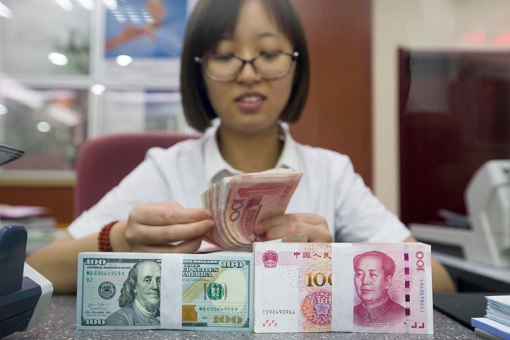
It was not a coincident that the Chinese central bank sets the yuan’s midpoint at 6.9225 against the dollar on Monday (August 5) – its weakest level since December 2018 – after China’s foreign ministry said on Friday (August 2) that the country does not want a trade war with the U.S. but is not afraid of fighting one. Trump immediately accused China of manipulating its currency.
Of course, People’s Bank of China Governor Yi Gang said China will “not engage in competitive devaluation, and not use the exchange rate for competitive purposes and not use the exchange rate as a tool to deal with external disturbances such as trade disputes.” All eyes are now on Trump if he will officially label China a currency manipulator.
It is now more than 3 years since Donald Trump told a New York campaign rally that China was ripping off America, and pledged to put an end to the unfair practise. Beijing simply ignores Washington’s whining and bitching, and made a cool US$961.8 billion in net income under President Donald Trump’s watch. By the end of this year, the Chinese would have profited US$1.1 trillion on goods sales in the U.S.
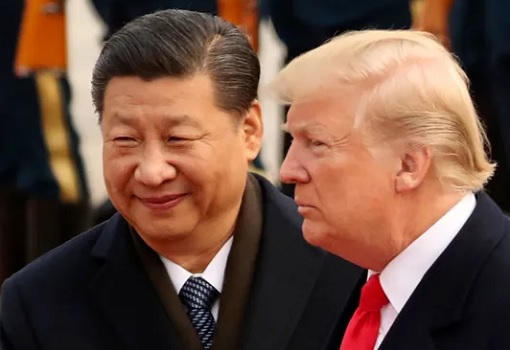
Other Articles That May Interest You …
- How Wall Street Lost 590 Points After Trump Slapped China With 10% Tariff On $300 Billion Goods
- Stocks Crashed 333 Points! – Powell Cuts Interest Rate But Not Enough To Satisfy Trump & Market
- The Trump Effect! – Home Sales Plunge 36% As Chinese Buyers Flee, Continue Dumping US Treasury
- Economists Thought China’s Economy Depends On The World – But McKinsey Research Shows Otherwise
- What Trump Doesn’t Want His Supporters To Know – China Lowered Tariffs To Everyone Except The U.S.
- China’s New Message To The U.S. – “Negotiate – Sure!”, “Fight – Anytime!”, “Bully Us – Dream On!”
- Trump Is Bluffing – He Will Not Let The Stock Market Collapse, And He Lied About Forcing China To Pay $100 Billion
- China Reveals Strategy To Fight U.S. Trade War – Stop Buying American Debt

|
|
August 5th, 2019 by financetwitter
|


|

|

|

|

|

|






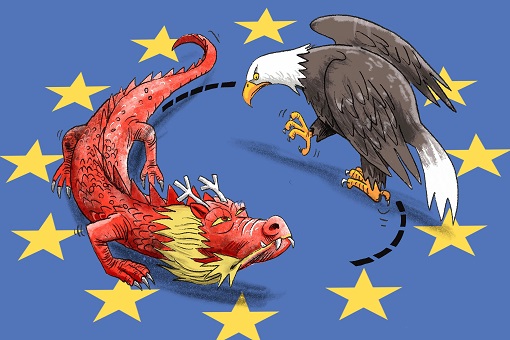





















please help sign my petition too and letter to school principal!!
https://www.change.org/p/prime-minister-of-malaysia-say-no-to-force-learning-of-jawi-khat-or-any-arabic-islamic-language-across-malaysia
SAY NO TO FORCE LEARNING OF JAWI/KHAT OR ANY ARABIC LANGUAGE ACROSS ALL MALAYSIA SCHOOLS